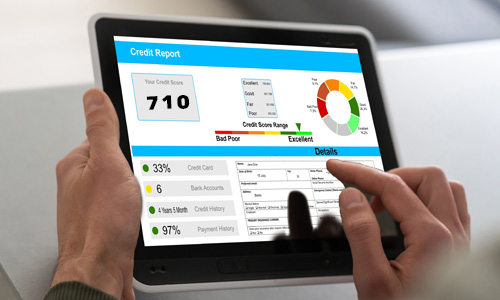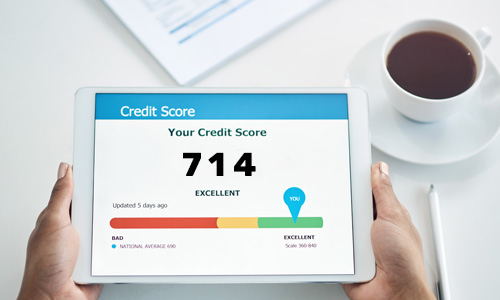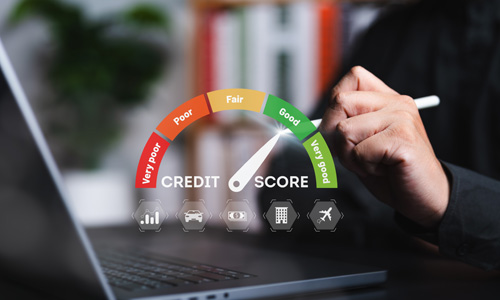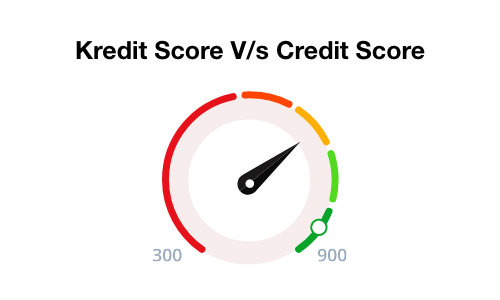What is a Bad Credit Score in the UAE?
In the UAE, the banks and credit-providing institutions utilise an Al Etihad Credit Bureau (AECB) credit score (among several others) to decide whether a particular customer is sufficiently reliable to be granted the loan. This article will discuss what is a bad credit score, how it impacts your credibility in the UAE, and what are the reasons behind a bad credit score range in the UAE.
Credit Score: An Overview
Credit score in UAE is a 3-digit number (ranging between 300 and 900) that showcases the credit worthiness of an individual or organisation. The more your credit score is near 900, the more the likelihood of you getting the application for the financial product or credit card of your choice approved. This score is obtained by employing statistical models that have multiple data points from your credit profile.
The credit report of an individual includes all their relevant personal information, credit facilities, bounced cheque details, and their payment history for up to the last 5 years. The information is provided by banks, financing institutions, telecommunication companies, and even courts. The banks can then evaluate the information to analyse if there is any risk in offering you a loan or any other financial product.
Credit Score Range in UAE
The following are the four credit score ranges generally followed by a majority of institutions in the UAE:
- Bad Credit Score Range - 300 to 619
- Fair Credit Score Range - 620 to 679
- good credit score Range - 680 to 730
- Excellent Credit Score Range - 731 and above
Reasons You Are in the Bad Credit Score Range in the UAE
- Skipping credit card payment
- Closing an old credit card
- Delay in repaying a loan instalment
- Irregular use of credit cards
- A major change in your financial situation
Impact of Bad Credit Score Range
The impact of being in a bad credit score range can be experienced by individuals in the following ways:
- Higher Interest Rate: As being in a bad credit score range may signal you as a risky borrower, lenders are likely to charge higher rates of interest to mitigate the risk. Consequently, if your loan gets approved at a high rate of interest, your borrowing costs will increase as well.
- Direct Rejection of Your Application: In case your score is excessively low, you will fail to meet the minimum credit score standard laid down by the lender. For instance, if your credit score is lower than 600, most financing companies will straightaway reject your loan application or keep it on hold until there is a co-signer.
- Renting an Apartment gets Expensive: If you are in a bad credit score range in the UAE, chances are that you may be asked to pay a high deposit amount. Some landlords may also require you to pay the first and the last month’s rent beforehand in such cases due to an increased financial risk in providing you with the required apartment.
- Difficulty in Applying for a Mortgage: When you have a bad credit score, there are fair chances that you would need to pay a higher down payment to be eligible for a home loan.
- Problems in Applying for a Car Loan: If you are in a bad credit score range, it can be difficult to apply for auto finance as per your needs. And while some lenders won’t reject your car loan application, they can end up charging you high fees.
- High Auto Insurance Rates: A significant portion of car insurance companies in the UAE charges high rates of interest owing to your bad credit score.
- Utility/ Telecommunications Accounts: Besides the banks and other financial providers, even utility companies can review your credit score before allowing you to open a new account. If you are found in the bad credit score range, you will be required to pay a refundable security deposit.
Major Myths Around the Bad Credit Score Range
While one should be aware of the major implications of bad credit score in UAE, it is also essential to avoid the following myths related to poor credit scores in the UAE:
Myths #1 - Your Loan Will Never Get Approved:
Although it is difficult to secure a loan or new credit card with a bad credit score, it does not mean that it will not get approved at all. Most lenders consider several other factors like the level of your debt, your monthly income, and so on, besides checking your credit score to provide the loans. Thus, chances are that you may receive still receive a loan in the UAE with a bad credit score, with the only caveat being that you will require to pay a higher rate of interest.
Myths #2 - Bad Credit Score Does Not Change:
When you become regular with your bill payments or start using your credit card judiciously, you are essentially improving your credit score. As you start paying the monthly instalments on the due dates and manage your finances properly, you can expect your credit score to reflect these changes.
Myths #3 - Closing a Credit Card will Improve Your Credit Score:
Closing a credit card abruptly can have a negative impact on your credit score. Credit history is a key factor in determining your credit score, and having a credit card for a long time can indicate your financial management acumen over a prolonged period. However, closing such a card can take it out of the consideration for credit score determination, which can affect your credit history and reduce your credit score.
Myths #4 - Applying for a New Credit Card can Reduce Your Credit Score:
The credit score remains unaffected when you purchase a new credit card. However, one must take care not to apply for multiple credit cards at a time or avail of more than one without specific requirements – doing any of these two can reduce your credit score.
How to Improve your Bad Credit Score Range?
Discussed below are some actions that you can undertake to improve your credit score:
Paying Bills on Due Date:
When you pay your card bills on the due date, you improve your credit card score. The benefits of paying bills on the due date are plenty, as you can also have a better grip on your finances with such timely repayments.
Monitor the Credit Regularly:
When you review your credit score regularly, you stay aware of all the factors related to it and the impact of your actions on the score. Regular monitoring of the credit report enables you to locate errors and correct them immediately. At the same time, you should avoid checking your credit score excessively to avoid a deduction in the score.
Reduce the Total Debt:
Only a few banks will be able to give you a loan if you are already in considerable debt. Thus, you must aim to pay off your debt to instantly increase your credit score and be eligible for loans at a minimal rate of interest.
Watch your Expenses:
If you use your credit card for shopping, regularly monitor your expenses as spending beyond the limit creates debt.
To Conclude
- A credit score is essentially a 3-digit number between the range of 300 and 900 that depicts the credibility of an individual or organisation.
- The more your credit score, the more the likelihood that you are at low risk of getting your finance or credit card application rejected.
- Individuals in the UAE should be concerned about bad credit score that ranges between 300 and 619.
- A bad credit score range can make it difficult for you to avail of a loan or credit card of your choice, and you may end up paying a higher interest rate in such cases.
- A bad credit score can also impact the availability and associated charges of property renting, utility services, and more.
- You can improve your credit score by regularly paying off your loans and dues, reducing your total debts, monitoring your expenses, and checking your credit score regularly.
| Credit Score for different types of Loan | |||
|---|---|---|---|
| Credit Score for Personal Loan | Credit Score for House Loan | Credit Score for Car Loan | Credit Score for Student Loan |

More From Credit Score
- Recent Articles
- Popular Articles












